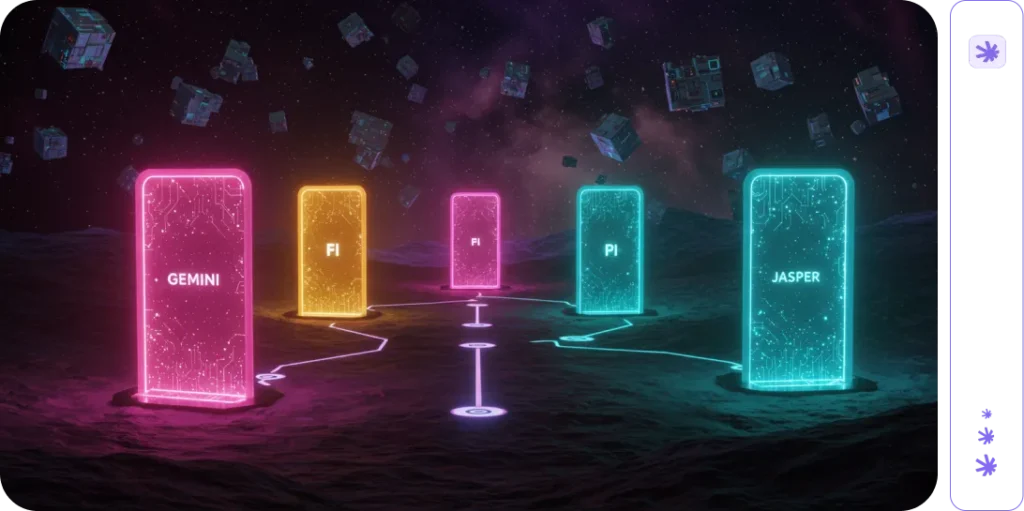The AI landscape is evolving at breakneck speed. ChatGPT might have captured the spotlight, but it’s far from the only player in town. Whether you’re hitting token limits, facing unexpected downtime, or simply looking for different capabilities, exploring alternatives makes perfect sense. I’ve spent countless hours testing various AI chatbots and language models to find the best ChatGPT alternatives for different needs.
What makes this exploration worthwhile isn’t just about finding a backup option. Each alternative brings unique strengths to the table – from specialized knowledge domains to different interaction styles. Some excel at creative writing while others shine with analytical tasks. I’m excited to walk you through these options, highlighting what makes each one special and why you might prefer it over OpenAI’s offering in certain scenarios.
Top ChatGPT Alternatives Worth Exploring
Let’s dive into the seven most promising ChatGPT alternatives that deserve your attention right now. Each offers something unique that might better suit your specific needs.

1. Claude by Anthropic
Claude represents perhaps the most direct competitor to ChatGPT in terms of general capabilities. Developed by Anthropic with a focus on safety and helpfulness, Claude excels at nuanced reasoning and maintaining context over long conversations.
What sets Claude apart is its “Constitutional AI” approach, designed to be helpful, harmless, and honest. In my testing, Claude demonstrates fewer hallucinations (making up facts) than ChatGPT, especially when handling complex topics. The conversations flow naturally, and Claude seems particularly adept at understanding creative writing prompts and ethical questions.
Claude offers two main models: Claude 2 (their most capable) and Claude Instant (faster but less sophisticated). Both provide generous context windows, with Claude 2 handling up to 100,000 tokens – significantly more than ChatGPT’s standard offering. This makes Claude excellent for analyzing lengthy documents or maintaining extended conversations.
The downside? Claude’s knowledge cutoff means it lacks information about very recent events, similar to ChatGPT’s limitation. However, for tasks requiring nuanced understanding and thoughtful responses, Claude often delivers more consistent results than its OpenAI counterpart.
Compare Claude with other AI chatbots to see how it stacks up in different categories of use.
2. Google Gemini
Google Gemini represents the search giant’s answer to ChatGPT. Built on Google’s PaLM 2 language model, Bard brings Google’s vast information ecosystem to conversational AI.
The standout feature of Bard is its integration with Google Search and other Google services. When you ask Gemini a question, it can pull current information from the web, creating responses that include recent developments beyond its training cutoff. This makes it particularly valuable for queries about current events or rapidly evolving topics.
Gemini also excels at creative tasks, from drafting emails to generating stories. The interface feels clean and intuitive, with options to export responses to Google Docs or Gmail with a single click. Google continues to add features at an impressive pace, including code interpretation, multi-modal capabilities (understanding images), and extensions that connect to other Google services.
In my experience, Gemini sometimes provides less detailed responses than ChatGPT for technical topics but compensates with its access to fresher information and smoother integration with productivity tools. It’s completely free to use, making it an excellent starting point for anyone curious about AI assistants.
Two More: Bing Chat and Perplexity AI
Bing Chat (now Microsoft Copilot) deserves special attention as it offers free access to GPT-4 technology – the same advanced model that ChatGPT Plus subscribers pay for. Microsoft’s partnership with OpenAI has created a powerful AI assistant integrated directly into the Bing search engine.
What makes Bing Chat particularly valuable is its real-time web access. Unlike standard ChatGPT, Bing Chat can search the internet for current information, citing sources as it goes. This makes it excellent for researching products, current events, or any topic where recency matters. The chatbot also includes three conversation modes: Creative, Balanced, and Precise, allowing you to tailor responses to your needs.
Perplexity AI takes a different approach, positioning itself as an “answer engine” rather than just a chatbot. It focuses on providing factual information with citations, making it ideal for research purposes. Each response includes links to sources, allowing you to verify information independently.
AI tools for business like these can dramatically improve your research efficiency and decision-making processes.
3. Open Source Alternatives: LLaMA and Falcon
For those concerned about privacy or looking for customizable solutions, open source models like Meta’s LLaMA and the UAE’s Falcon offer compelling alternatives to closed systems like ChatGPT.
LLaMA (Large Language Model Meta AI) has quickly gained traction in the developer community. While initially restricted, Meta has gradually opened access, allowing developers to run sophisticated AI models locally on their own hardware. This means your data never leaves your system – a significant privacy advantage over cloud-based alternatives.
The open source nature of these models allows for fine-tuning and specialization. Communities have created numerous derivatives optimized for specific use cases, from coding assistance to creative writing. Models like Alpaca, Vicuna, and WizardLM build upon LLaMA’s foundation with improvements targeted at particular applications.
Running these models does require technical know-how and adequate computing resources. However, projects like LM Studio and various Google Colab notebooks have made deployment more accessible to non-experts. For organizations with specific needs and privacy concerns, these open source alternatives provide flexibility that closed systems cannot match.
Explore open source AI models if you value transparency and customization over convenience.
4. Specialized AI Assistants: Jasper and ChatSonic
While general-purpose chatbots like ChatGPT excel at versatility, specialized AI assistants focus on excelling at specific tasks.
Jasper AI has carved out a niche in content creation and marketing. With templates designed specifically for blog posts, social media, emails, and advertising copy, Jasper delivers more immediately useful results for marketers than general AI assistants. Its interface is built around content workflows rather than open-ended conversation, making it more efficient for specific professional use cases.
ChatSonic by WriteSonic offers a middle ground, combining ChatGPT-like conversational abilities with specialized features for business users. Its standout capability is real-time internet access, allowing it to discuss current events and incorporate up-to-date information in responses. ChatSonic also includes image generation capabilities and voice interaction options missing from base ChatGPT.
Both options come with subscription costs but offer free trials to test their functionality. For business users seeking direct ROI from AI tools, these specialized assistants often provide more immediate value than general-purpose alternatives.
AI copywriting software like Jasper can dramatically improve your content creation workflow and marketing efficiency.
5. Character.AI for Creative Interactions
For those using AI primarily for creative or entertainment purposes, Character.AI offers a unique alternative to ChatGPT. This platform allows you to chat with AI personas based on fictional characters, historical figures, or original creations.
What makes Character.AI special is its focus on personality and roleplaying rather than utility. Conversations feel more like interacting with distinct characters than with a neutral assistant. This makes Character.AI particularly popular for creative writing, storytelling, language practice, or simply entertainment.
The technology behind Character.AI comes from former Google engineers who worked on LaMDA, and it shows in the system’s ability to maintain consistent character voices across conversations. The platform includes thousands of pre-made characters and allows users to create their own.
While not ideal for factual research or professional tasks, Character.AI excels at creative interactions that feel more engaging and personal than typical AI assistants. It’s free to use with optional paid tiers for priority access during busy periods.
Discover more creative AI tools that can enhance your digital experience beyond standard chatbots.
How to Choose the Right ChatGPT Alternative
Selecting the best ChatGPT alternative depends entirely on your specific needs and use case. Here’s a practical framework to help you decide:
Consider Your Primary Use Case
Start by identifying exactly what you need the AI assistant for:
- Research and information gathering: Perplexity AI or Bing Chat excel with their citation capabilities and web access
- Content creation and marketing: Jasper or ChatSonic offer specialized features for these professional tasks
- Personal assistant and productivity: Claude or Gemini provide well-rounded capabilities with different strengths
- Development and technical tasks: Open source models like LLaMA offer customizability
- Creative writing and roleplay: Character.AI provides unique interactive experiences
Technical Requirements Matter
Consider the technical aspects that might influence your choice:
- Context length: If you need to process long documents or maintain extended conversations, Claude’s 100K token context window provides an advantage
- Real-time information: For current events, choose options with internet access like Gemini, Bing Chat, or Perplexity AI
- Privacy concerns: Open source models you can run locally offer the best privacy protection
- Integration needs: Consider how the AI needs to fit into your existing workflow and which systems it must connect with
Compare technical specifications of different AI assistants to find the right fit for your requirements.
Budget Considerations
Your budget inevitably plays a role in this decision:
- Free options: Gemini, Bing Chat, Character.AI, and Perplexity AI offer capable free tiers
- Mid-range subscriptions: Claude and ChatGPT Plus provide enhanced capabilities for $20/month
- Business-focused solutions: Jasper and enterprise tiers of other services cost more but offer specialized features and higher usage limits
I recommend starting with free options to test functionality before committing to paid subscriptions. Many premium services offer trial periods that let you evaluate their unique benefits without immediate investment.

Practical Applications of ChatGPT Alternatives
Let’s explore how these different ChatGPT alternatives can be applied to practical scenarios:
Business Applications
For businesses looking to integrate AI into their operations, different alternatives shine in distinct areas:
Customer Service: Claude excels at maintaining a helpful, friendly tone while handling complex customer inquiries. Its ability to remember details throughout a conversation makes it ideal for customer support scenarios where context matters.
Marketing Content Generation: Jasper’s specialized templates help marketing teams create consistent content across channels. Its focus on marketing-specific outputs makes it more efficient than general AI assistants for these tasks.
Research and Analysis: Perplexity AI and Bing Chat provide cited information that can be verified, making them valuable for business intelligence and market research where accuracy is critical.
At TechMim, we’ve helped numerous businesses implement the right AI solutions for their specific needs. Our AI integration services can help you select and deploy the perfect ChatGPT alternative for your business requirements, from customer service to content creation.
Personal and Educational Uses
For individual users, ChatGPT alternatives offer diverse benefits:
Learning New Subjects: Gemini integration with Google Search makes it excellent for exploring new topics, with the ability to dive deeper through linked resources.
Language Practice: Character.AI allows conversation with characters in multiple languages, providing a fun way to practice language skills in context.
Creative Writing: Claude’s nuanced understanding of creative prompts makes it a stronger partner for fiction writing and storytelling compared to most alternatives.
Coding Assistance: Open source models fine-tuned for programming can provide more specialized code help than general-purpose assistants.
Explore educational applications of different AI chatbots to enhance your learning experience.
Conclusion: Finding Your Perfect AI Assistant
The exciting truth about today’s AI landscape is that you don’t need to commit to just one solution. Different situations call for different tools, and the best approach often involves using multiple ChatGPT alternatives based on the task at hand.
I recommend starting with Claude for nuanced conversations and complex reasoning, Gemini for information that needs to be current, and exploring specialized tools like Jasper when you have specific professional needs. The open source route provides fascinating possibilities for those willing to invest time in setup and customization.
Remember that this field is evolving rapidly. New capabilities and models emerge monthly, so staying flexible and willing to experiment will serve you well. What matters most is finding the tools that enhance your specific workflow and help you achieve your goals more effectively.
Want personalized advice on implementing AI solutions for your business or website? TechMim offers free consultations to help you navigate these options and integrate the right AI tools into your digital strategy. Explore our AI integration services to learn how we can help you leverage these powerful technologies.
Discover business-specific AI applications that can transform your operations and customer experiences.
FAQs About ChatGPT Alternatives
Which ChatGPT alternative has the most up-to-date information?
Gemini, Bing Chat, and Perplexity AI all offer real-time web access, making them superior for current information and recent events.
Are there any completely free alternatives to ChatGPT?
Yes, Google Gemini, Bing Chat, Character.AI, and Perplexity AI all offer robust free tiers without requiring subscriptions.
Which alternative is best for content creation?
Jasper is specifically designed for content creation with templates for various marketing formats and business writing needs.
Can I run any of these alternatives locally for privacy?
Open source models like LLaMA can be run locally on sufficient hardware, providing maximum privacy protection for sensitive information.
Do any alternatives handle longer conversations better than ChatGPT?
Claude excels with long conversations, offering a 100K token context window that far exceeds ChatGPT’s standard limits.
Which alternative is most reliable during high-traffic periods?
Gemini and Claude typically maintain better availability during peak usage times when ChatGPT experiences slowdowns.
Are there specialized alternatives for coding and technical work?
GitHub Copilot and various LLaMA-based open source models fine-tuned for coding provide specialized assistance for developers.















